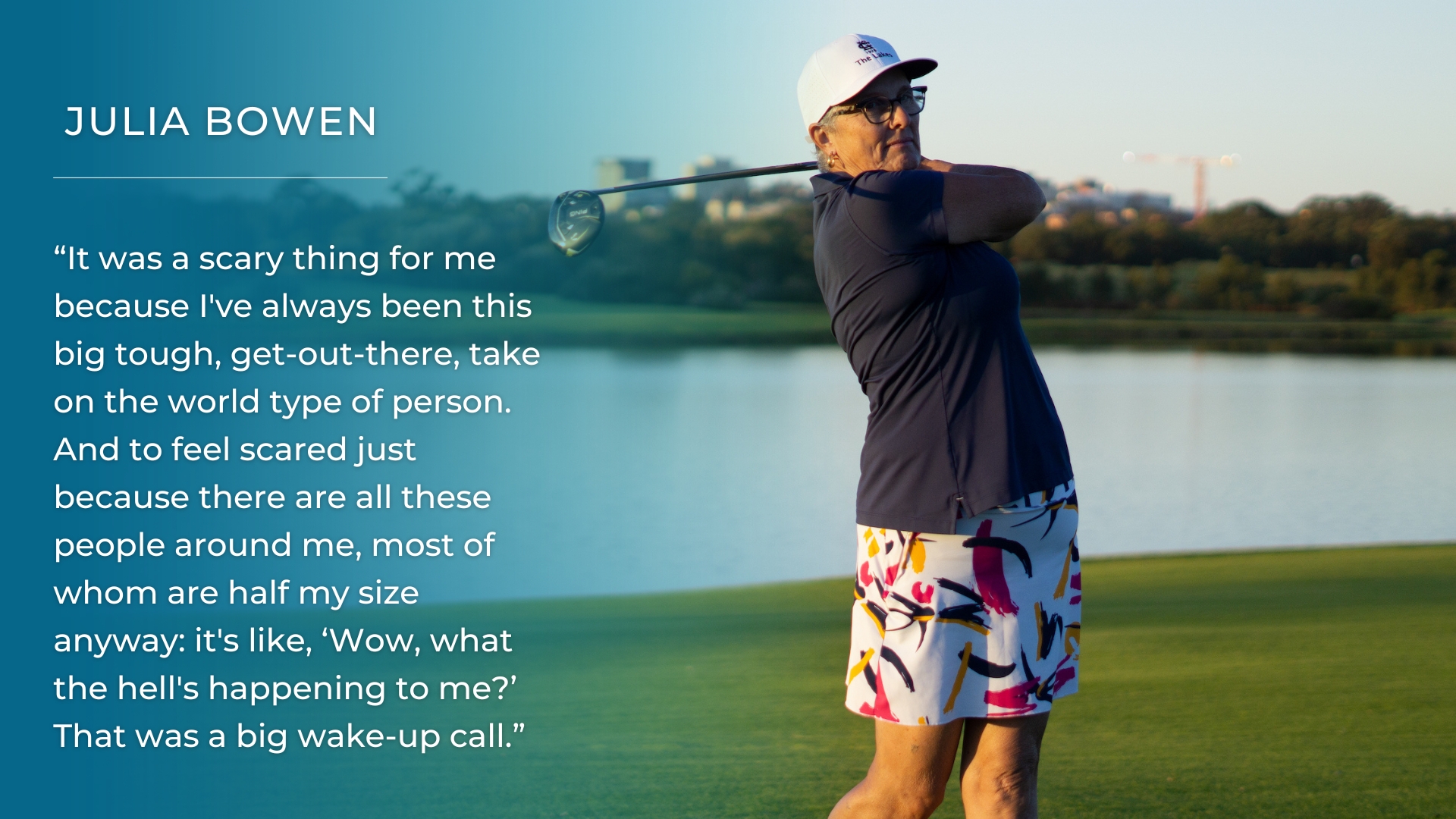The quote in Julia Bowen’s picture above describes one of her first days out after three months in hospital in Sydney in 1996, following a bad motorbike crash. The problems faced by serious injury and a long period of rehab can affect people in different ways. Meet Julia today and she appears so confident and such a lover of life, you simply can’t picture her clamming up at a busy tourist centre, wanting to flee the scene.
Thankfully, 27 years on, and that smiling, ‘take on the world’ character has more than recovered her steel and is looking to do just that. At 60, if you try to slow her down, Julia might swear at you under her breath, but at the same time, if you want to gain some positive energy about work, life, golf, or all of the above, she might be just the person who could provide this.
In terms of work: clarity in decision making might be on offer, the ‘what works’ instead of management ego. On life: how to get out from being trapped under a car, managing chronic pain but still pushing forward, keeping active and setting goals, cracking jokes, while being straight with people and thoughtful towards others, are all part of the recipe it seems.
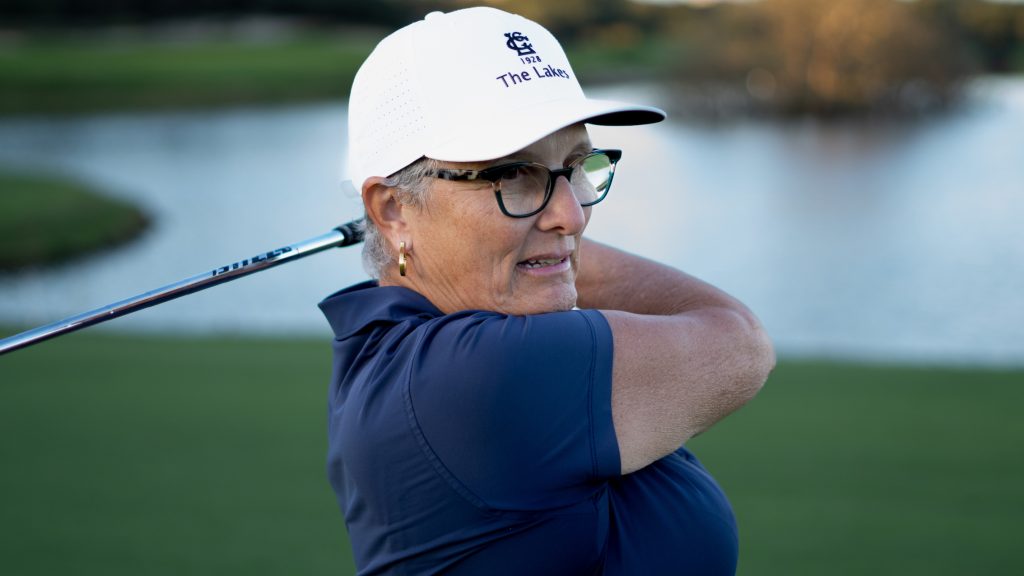
And what about golf? From finding something she loved to help her wellbeing and recovery from serious injury, to competing with an 85 year-old friend and laughing in defeat, to (somewhat tipsily) caddying for Martin Kaymer, to the kind of focused determination which has got her down to a scratch handicap and her qualifying recently to play in the prestigious G4D @ Tour Scandinavian Mixed in June, 2023, Julia’s experiences can surely inspire others as to the value of golf as a sport.
For Julia, “it’s everything about the game”. She loves golf, and says that she would recommend it – without missing a heartbeat – to anyone who has been injured or is impaired.
“It’s both the most frustrating game and the thing that offers me the most pleasure, being that it’s so difficult. It’s the one thing where at times I’m saying, ‘I’m never going to conquer this’. And I’m not going to, because nobody ever does, right? But it’s funny how every now and then…”
Julia adds: “Like when I got that invitation to Sweden, I thought, ‘Oh, heck, maybe I am quite a good golfer’. Peter [her partner] says, ‘Of course. Would you shut up? I’m sick of hearing this’.”
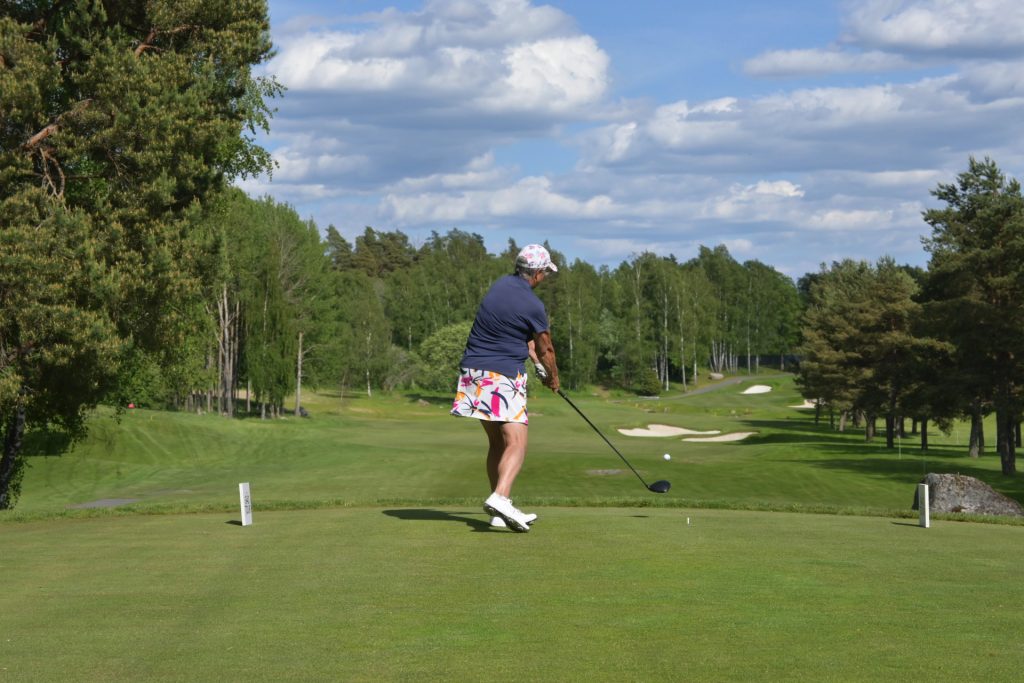
Julia is getting into her flow: “You keep measuring yourself against this higher and higher standard, so you have to work for it. And I do enjoy that. But I enjoy the fact that you never get as good as you want to be, and you almost never hit the perfect shots you want to hit. At times I get a bit annoyed with myself because I think I ought to celebrate my wins a bit more. Not just wins in tournaments, but when you achieve some amazing shot or have a really good round. I should be saying, ‘Yes, I am good. Thank God I managed that’.”
This is about testing herself as much as winning trophies. The great thing about the scoring systems and golf handicaps is that they can set up wonderful matches for friends of different abilities and even generations.
“I play with a lady quite a bit who’s 85. She’s about three foot nothing tall and she used to play off quite a low handicap, a past club champion at The Lakes, she’s been a member there for 64 years. And she routinely beats me in a Stableford game because she’s playing off a 35 handicap. I played with her on Sunday and she beat me by a point. I couldn’t believe it!”
Interestingly, even a person who seems very confident, savours the welcoming atmosphere of a good golf club, as a safe environment for a person with disability.
“So for me as a woman, I go there on my own, and they know I’m disabled, but I can feel safe. It’s a really safe place for me to be. I can just go out and have fun. I don’t have to worry about whether I’m going to get attacked, whether I’m going to get ridiculed. Well, I might get ridiculed, but that’s because of my mouth and the things that come out of it, not because of my shoulder.”
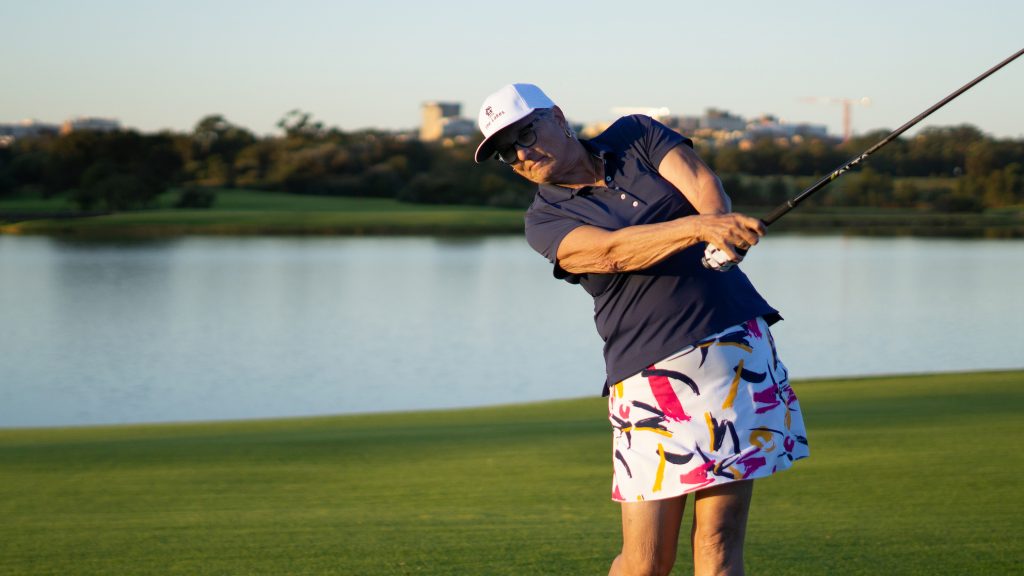
This mouth of Julia’s, the plain speaking, not wanting to get bogged down by the mundane, and also to make friends laugh. With a multi-faceted career in management in the commercial field (first IT and telecommunications and then healthcare) and more latterly in the charity sector, she is a busy person. Meeting her, you get the feeling she is honest with herself about her capabilities and flaws and expects the same from others. But then Julia will laugh in such an infectious and disarming way that you want to hear her laugh again.
In 1996, aged 34, Julia was on her motorbike returning home from work in Sydney on a dark evening, not far from the famous Harbour Bridge, when a driver ploughed across the intersection and ran her down – and over – pinning Julia to the concrete with her car when it came to rest.
“They ran over my head and parked on my shoulder, which was a bit scary. Luckily, it was right outside the fire station in Crows Nest [a Sydney suburb], and the firemen later said, ‘We heard the crash and we came outside and we knew immediately what we had to do, because coming out from underneath the car were some very firm instructions’.”
That was more plain speaking from Julia to keep things moving. A group of people lifted the car up away from her with her “right arm basically hanging off” and her lying in pain on the ground. In her shock she became worried about her dislocated little finger, and asked a fireman to pop it back in.
“So this guy goes, ‘Sweetheart, you are not going back on for the second half. I think we’ll leave it.’”
Julia admits the rehab was tough, as was coming to terms with now living with severely limited use of her right arm and what would develop into a degenerative spinal complaint following her accident, despite more recent surgeries.
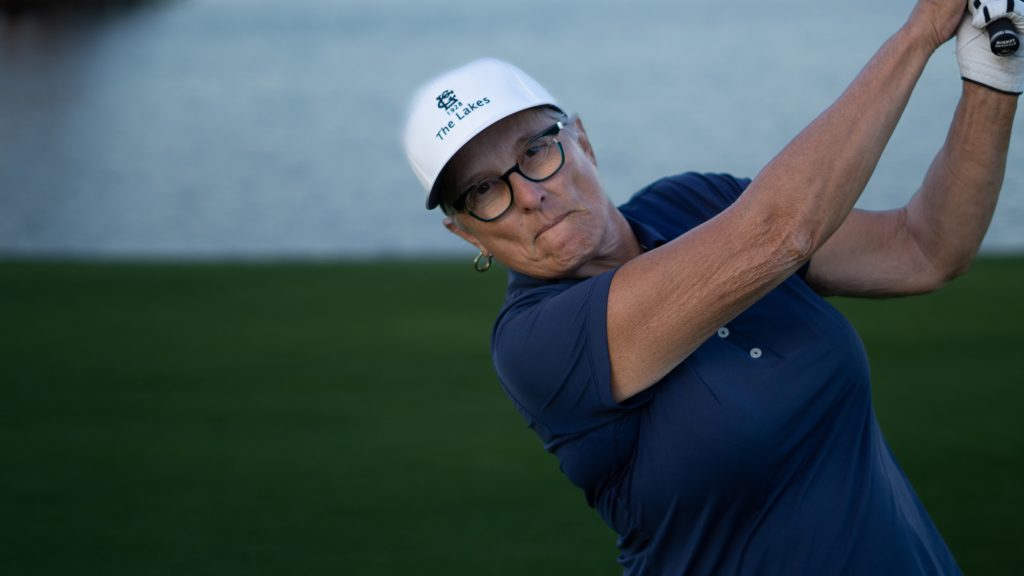
“I had three months in hospital doing nothing, to think about it all. It was awful because being sporty and being active had been so much a part of my life. At that point the really big injury was only my right arm and shoulder, but it just meant I couldn’t do anything. Tennis was a really big part of my social life, I used to play with some friends at a decent level. And, because I had a lot of crush injuries, I also had problems with my heart and my liver.”
Julia continues: “It was really weird because when I came out of hospital, I remember I went down to Circular Quay, where the ferries come in across the harbour, and with all these people, I just freaked out and had to go and hide in the corner. It was scary because I’d always been this big tough, get out there, take on the world type of person. That was a big wake-up call.”
The pain remains constant, she explains, but it can sometimes hit her harder even now. It sweeps into her spine, legs, shoulder, and down her arm and the only respite is via painkillers.
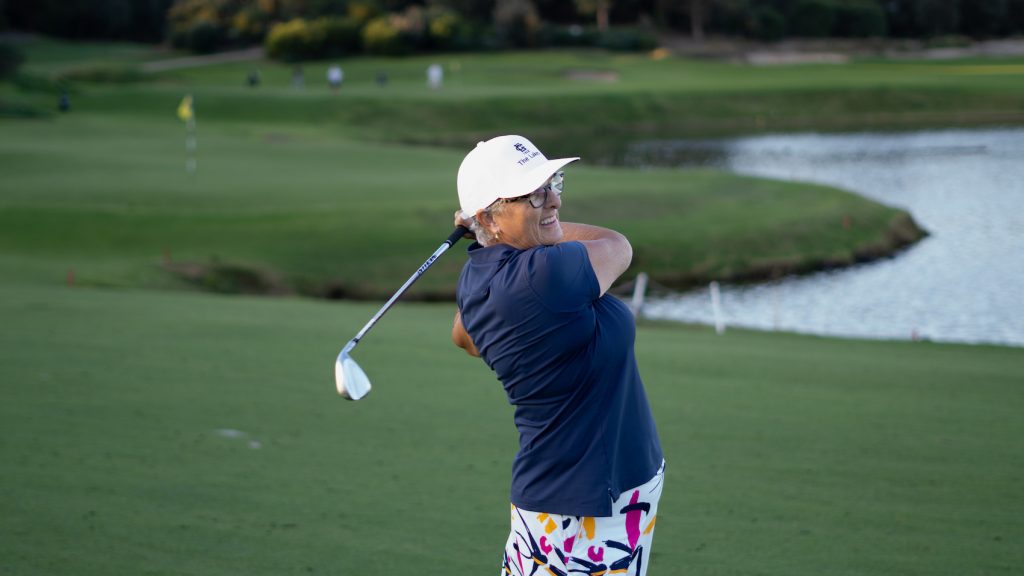
“I take I think eight pills in the morning if I’m playing golf, but only six if I’m not!”
In typical Aussie style, Julia doesn’t like to complain, including joking about the accident with wry humour. That’s why it is surprising to learn that she was actually born and raised in Dorset, south-west England, the Thomas Hardy country of village greens, Morris-dancers, the coast around her home in Portland. Like all English kids back in the day she would have joked about digging to Australia.
Her father Timothy was a science teacher turned accountant and her Mother Patricia was a Maths teacher. In 1985 in her early twenties she married an Australian naval officer stationed on Portland and moved to Australia, first to the “government town” and capital of Canberra, before moving to Sydney in 1987 when pregnant with her daughter Amelia and settling there.
Australians would be proud to claim Julia: a sprinter at school, she would use her long stride and tall frame to run a best of around 11.2 seconds for the 100 metres at the age of 16, and would find herself in the same race at Crystal Palace with the later famed GB runner Kathy Smallwood-Cook, who would go on to win three gold medals in sprint relay in the Commonwealth Games and three bronze medals in The Olympics in and around the early 1980s. Such was her sporting pedigree that in 1977, Julia would become one of the very first female rugby union referees in the world. Indeed, it was at an Australia v England rugby international, with the Australian players greeting her that she first realised that she had become a genuine Aussie.
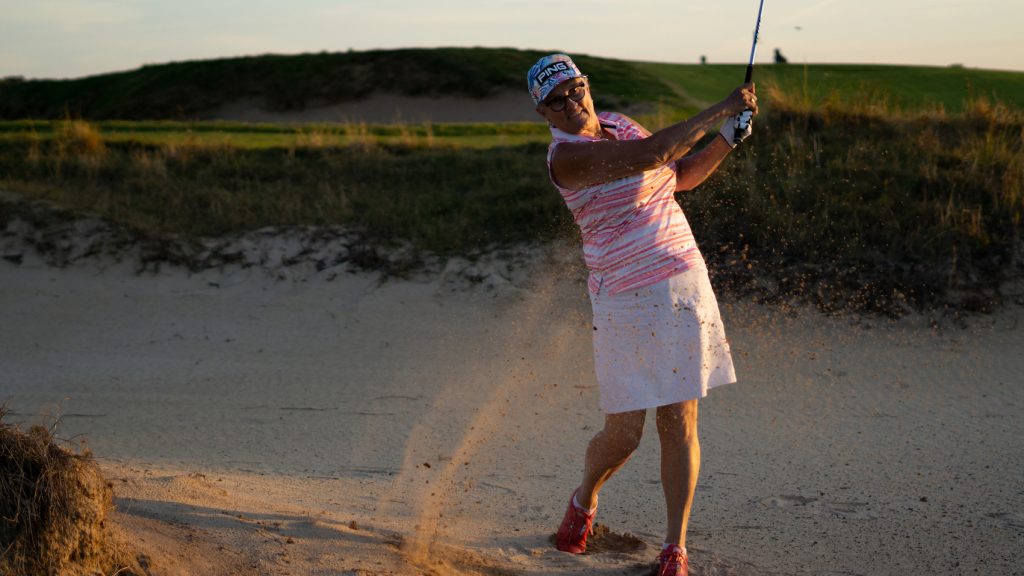
Following her accident, golf didn’t appear on Julia’s wavelength for another five years or so. Instead, she threw herself into her work as a senior executive for a multinational telecommunications firm, before redundancy led her to pause and take stock of life.
“I’ve never not worked. So I remember I went home, and sitting there one day going, what do people do when they don’t have a job? I thought, ‘You know what, I really miss being a competitive sports person,’ and because of my disability, there’s not very many sports I can be competitive at. I thought, ‘Golf has got a handicap system. Sounds like it’s made for me. Right?’”
Her first experience of club golf in a ladies’ section didn’t go well for Julia and she says she felt marginalised just for wanting to improve her game and take it seriously. But she took lessons, and played and practised every day for six months, seeing her handicap drop from 45 to 16. Things changed markedly when she went to join Long Reef GC and then The Lakes, near Sydney, where she continued to improve into single figures and then the hallowed scratch, and +0.1, of recent times.
With these improvements her expectations heightened: Julia has recently played in Golf Australia’s Victorian and Queensland Inclusive Championships and all four PGA Webex Players Series events.
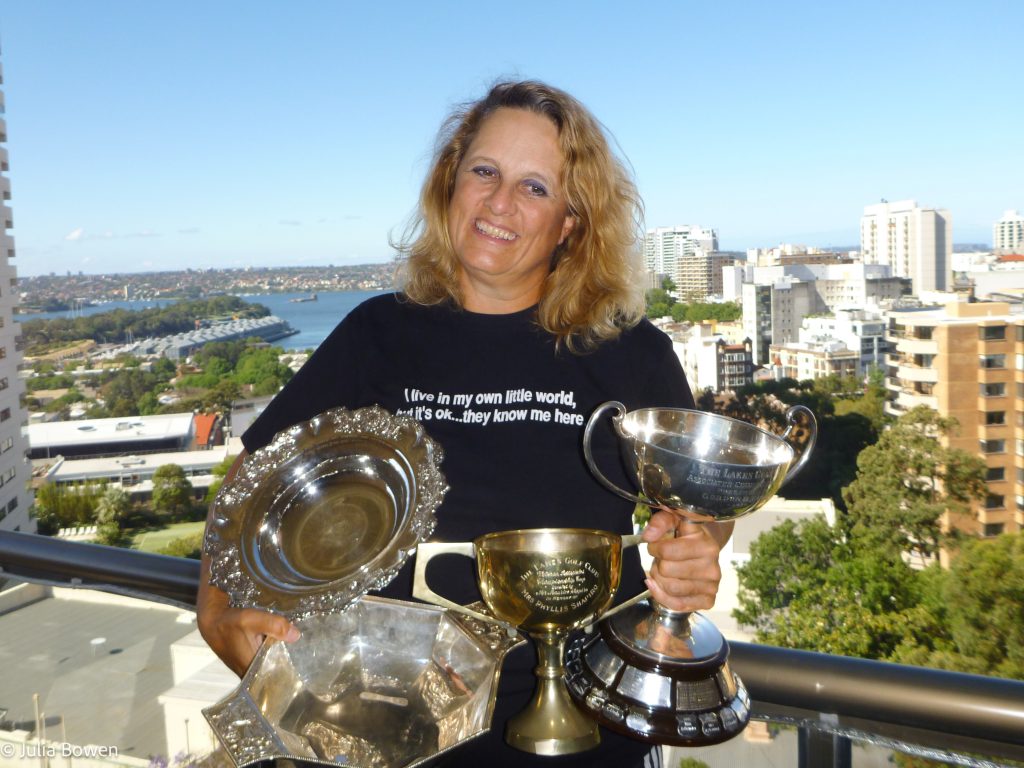
Because of her condition Julia doesn’t really practise; she’ll warm up a bit and maybe hit a few balls but then it is chipping or on the putting green. Here, she clearly revels in having a delicate and sound touch, the secret to her good scoring formed by her confidence in holing decent putts and having the courage to get out of tight spots.
Julia met her partner Peter in 2010 through work, he is a registered psychologist, “and needs all his professional skills when caddying for me!” The pair are immersed in the regular golf scene at Long Reef and The Lakes. One of her favourite stories is how, when she and Peter had got a little merry on Australian red in the clubhouse, Julia ended up caddying for a hole in a corporate event for former US Open champion and Ryder Cup hero Martin Kaymer. Sitting in her buggy her stage whisper of “too far right!”, followed by a splash, was heard by all, so Kaymer enlisted her help on the next couple of shots – after all, she was club champion at the time – and the result was an eagle on the iconic par five 11th hole and a photograph of Martin Kaymer and Julia smiling together that has pride of place at home.
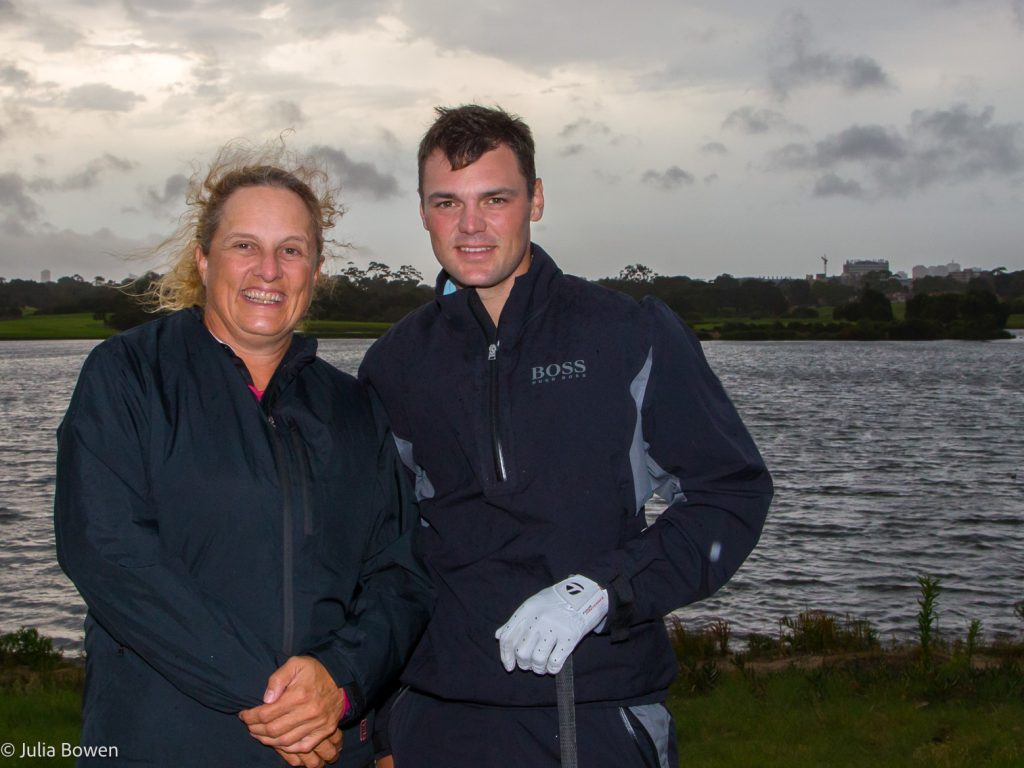
Her appearance on the G4D Tour in the Scandinavian Mixed was the latest landmark in her golfing journey from novice in 2002.
Julia says she really enjoyed meeting the other EDGA players involved in Sweden.
“It was just nice to meet all these people who have been through a lot of similar things to me. It’s like, yes, we are just all there together. I like the whole inclusive EDGA thing. I think that you’re just… ‘Come on in, fine!’. There’s obviously the formal process of ensuring that the disability that you have actually does impact on your game, and I think that’s entirely reasonable. I was actually quite surprised when they said, ‘Oh yes, yes, you qualify’. I thought, ‘Oh, that’s quite nice’.
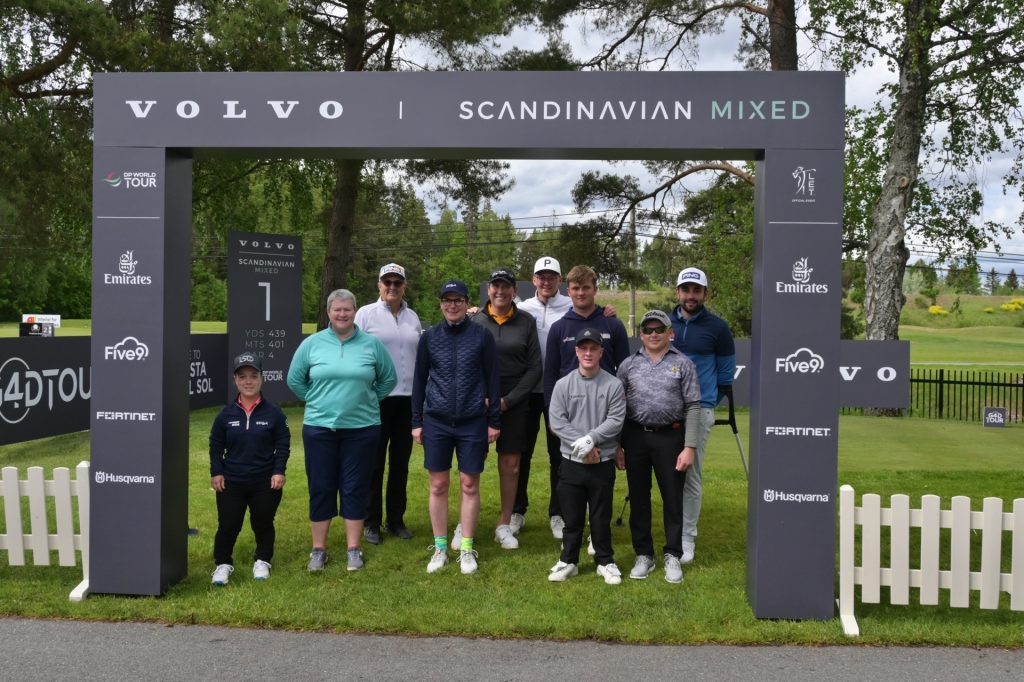
“Before then I’d never really thought of myself as being part of that community. And now I feel like I really am. Having been part of this WebEx series that I got invited to play in, I met a lot more players through that as well. I listened to their stories and I took a lot of photos. Quite genuinely, we all respect each other’s efforts that we’ve been through, even though we don’t know what they are, but just to get to where we are.”
Referring back to her accident and its aftermath, Julia says: “This has absolutely altered my life. I’ve made various decisions along the way about things I can do and can’t do, career decisions. I know it sounds silly, but because I can’t use my right arm very much, there are certain careers that are just not open to me. That’s okay. That’s just life. So it’s not just about what sport I can play and the fact that I’m in a community of other people who have been through that to a lesser or most probably greater degree. I think it just feels safe to me. That’s a very big thing as a woman in a sporting community, I think that’s actually very important.”
Julia is conscious that there are a lot of people to thank concerning her golf. Crucially, her partner Peter, for his never-ending patience both at home and on the golf course. Also, Christian Small, Julia’s coach for the past 10 years or so, “for working with my limitations to get my golf to where it is now”.
And: “The many and varied friends I have made over the past 20 years at golf who have supported, encouraged and reassured me that I am actually quite a decent golfer! The entire team at EDGA who have created an amazing system and culture that makes all of this possible, Christian Hamilton of Golf Australia for his tireless efforts to grow golf for the disabled – especially for women – and the Australian PGA and DP World Tour for creating the opportunities to experience major tournaments.”
Julia told us that she has enjoyed so many rounds with fellow golfers who understand the spirit of the game and how it should be played, and thus the thank you list could be longer. However, with her rich humour, her ‘take on the world’ character and her wanting to drive others to reach their best as well, we expect Julia is on quite a lot of such lists as well.
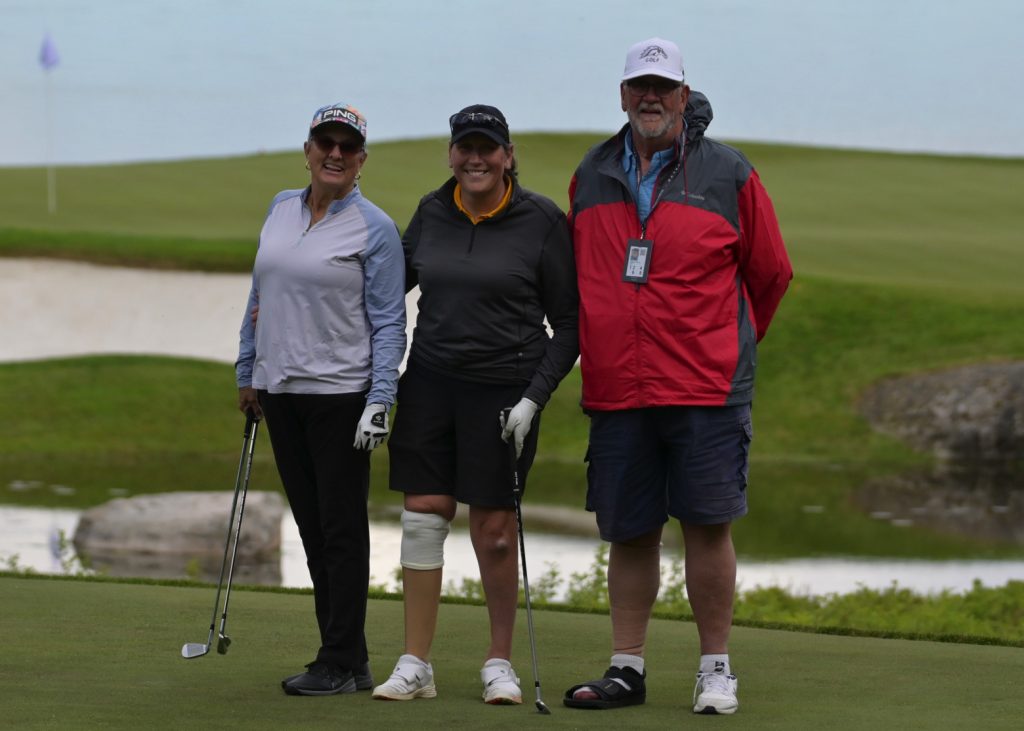
NB: When using any EDGA media, please comply with our copyright conditions


